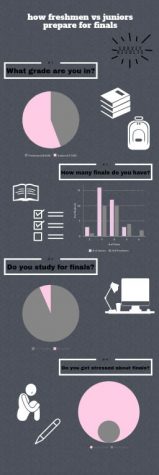How freshmen vs juniors prepare for final exams
December 18, 2019
As the semester comes to an end, students are preparing for their long-awaited and stressful finals for many classes. After learning the material for the last several months, high school students have been beginning to study in order to do well on their final exams. From freshmen to seniors, different ages of high schoolers seem to prepare with many techniques that may differ from those of others.
Students tend to prepare for the many tests in a number of ways, whether it be due to their current grade in the class, how difficult it is for them, or how much of their grade the final is worth.
“For the classes I know I struggle in more, I study more for,” junior Addison McClary said, “But for the classes, I don’t have that hard of a time in, I definitely study less for.”
Although many students have already gone through the process of taking finals, multiple freshmen are just getting accustomed and prepared for the tough week of tests ahead that they must complete. Figuring out what to study and how to do it creates many questions amongst them. Freshman Eden George, expressed how she has studied so far and how she feels about the new experience.
“I am stressed for finals, but I think I will feel better after I take them,” George said, “I’m just nervous.”
When it comes to comparing upperclassmen, like juniors, to freshmen, who are just being introduced to the finals process a definite difference can be seen. In a survey conducted between freshmen and juniors who are taking finals, it is shown that for the most part juniors seem to be more prepared due to their past years of taking these tests. Another pattern that can be seen in the infographic is that freshmen tend to have more exams.
“Most of my classes are just a breeze and as long as I review the material it’s not that stressful for me,” McClary said.
Not only do students have to prepare for these exams, but so do teachers. They have to make sure their students are as best prepared as possible. Many teachers advise their classes to study for these important tests due to how much they are worth. Whether the students take time to study or not is determined by themselves. Making sure students have the right mentality is another tip that helps them earn better results as shared by York science teacher, Claire Birns, who provides many ways for her students to prepare.
“I recommend students to work on the study guide without notes first to see what they can accomplish,” Birns said, “Once they finish all they can, I would suggest using notes to finish the study guide. The Biology website has a lot of great resources like screencasts as well as notes we have taken to help students study. I would suggest that if they are still confused to come and set up an appointment with me.”
In order to balance finals, students must take into account all their tests and which ones will be easier to complete. When analyzing the amounts of finals juniors have, compared to freshmen there doesn’t seem to be too large of a gap, although there is one. The number of finals the students need to take will be based upon their classes during the semester. According to the survey, the smallest amount of finals has been two, coming from a junior, and the greatest amount has been six, from a freshman.
“Freshman year I think I had five or six and now I have three,” McClary said.
In general, students seem to be more prepared the more accustomed they are to the exams and the whole finals procedure. Once finals are over, students feel relieved and get back to learning new material or taking a nice break for the holidays.
“It is important to study for finals to make sure your final grade is what you want and expect from yourself,” freshman Adriana DiMarca said, “In the end, you feel accomplished for yourself but, if you get a bad grade you can be harder on yourself next time.”

